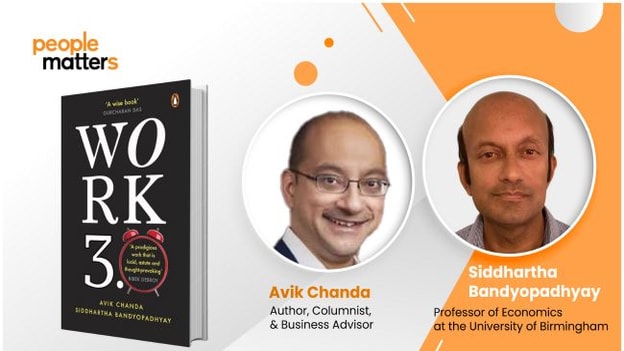Work 3.0 A fresh take on the past, present, and future of work

Work 3.0 by Avik Chanda and Siddhartha Bandyopadhyay offers a comprehensive exploration of the evolving work landscape in the era of technological progress. The book highlights the crucial importance of targeted interventions to enhance skills and adapt to the anticipated shift in future skill demands.
With a focus on India, the book sheds light on the challenges and opportunities that arise from technological innovations in the country. However, the book's relevance extends beyond national borders, as Avik Chanda, one of the authors, emphasises that it addresses significant issues prevalent both in India and worldwide.
For example, Chanda points out, 'Working from home or adopting hybrid work models brings numerous benefits, but it can also exacerbate mental health concerns and lead to increased isolation. Various surveys highlight this global 'mental health pandemic' that extends beyond India's boundaries.”
Work 3.0 is designed to guide readers in analysing emerging trends and cultivating the adaptable mindset required to thrive in the globalised landscape of work.
The initial section of the book provides an insightful exploration of the ever-evolving nature of work driven by technological and process innovation. The authors highlight the concept of 'creative destruction' and its implications for progress, particularly for countries without robust social safety nets. India's transition into Industry 4.0, characterised by technological advancements, is examined, raising important considerations about the impact of these changes on society.
Another key section of the book delves into the historical resistance to mechanisation and automation, drawing parallels with the current debate on AI and automation. They challenge pessimistic predictions and showcase India's adoption of modern practices and the cultivation of emerging skills in its economy. The authors debunk myths surrounding the impact of automation on employment, emphasizing that job losses can be influenced by factors beyond automation itself.
The book extensively explores the shifting landscape of labor demand, drawing upon insights from McKinsey's Global Index study, providing forecasts on the shifting landscape of labour demand. They examine the influence of increasing incomes, demographic changes, and technological advancements on the demand for different skill sets. The chapter also underscores the significance of behavioural competencies such as resilience, growth mindset, positive emotions, and future-mindedness for thriving in the future workplace.
The chapter titled "Educational, Innovation, and Productivity" explores the impact of technology on cognitive processes and highlights the crucial role of foundational literacy in enhancing workplace productivity. The authors address concerns regarding the potential pitfalls of technology, advocating for a balanced approach. They shed light on the role of education in mitigating economic inequality and discuss India's initiatives aimed at bridging educational gaps.
The book also delves into the profound effects of the pandemic on mental health and well-being. The authors explore coping strategies, the shift to remote work, and the alarming rise in mental health conditions. The importance of addressing mental health comprehensively in the workplace is emphasised, and recommendations for organisations to prioritise mental health are provided.
The authors address the complex issue of inequality in the post-Covid world. It examines the impact of inequality on economic growth and societal well-being, debunking the misconception that the pandemic has levelled the playing field. The authors highlight the challenges and underscore the significance of fostering diversity, equity, and inclusion in the workplace.
In the final chapter titled "Emergent Technologies and Probable Futures," the authors explore the ethical implications and potential risks linked to emerging technologies, including the Metaverse. They raise critical questions about profit motives, cybercrimes, and privacy, highlighting the importance of establishing legal frameworks to address these concerns. The chapter envisions a future with virtual offices and digital human technology while highlighting the need for caution regarding potential risks.
In conclusion, Work 3.0 is a detailed exploration of the evolving nature of work with insights into the work ecosystem, including mental health, economic circumstances, and marginalised sections of society. With practical recommendations and a global perspective, it serves as a good resource for navigating the dynamic landscape of work and fostering inclusivity and innovation.












